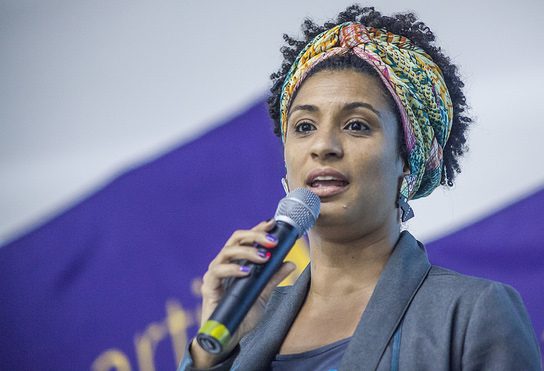“We don’t know who killed Marielle or who gave the order to kill her.” says the widow
Civil society organisations discussed the militarisation of public security and the execution of Marielle at an event in parallel to the 39th session of the UN Human Rights Council.

“I stand here today to denounce the Brazilian state and its incompetence in solving the most serious political crime committed in recent years in our country, the assassination of my partner, councilwoman Marielle Franco and her driver, Anderson Gomes.” This denunciation regarding the dearth of answers, six months after the brutal assassination of the councilwoman and her driver Anderson Gomes was how Monica Benício, Marielle Franco’s widow, started her speech.
Monica participated in the event “Militarisation of public security: federal intervention in Rio de Janeiro, extrajudicial executions and risks for human rights defenders,” that brought together representatives from Brazilian civil society to discuss the escalation in public policies on security and the impact of this on people’s daily lives, particularly of those living in favelas and underprivileged areas.
Discussions drew attention to the unconstitutionality of the decree that authorized the military-style federal intervention in Rio de Janeiro and also to why militarisation is not the best answer to address the issue of public security. Participating in the debate were: Camila Asano, Programme Coordinator at Conectas; Renata Neder, Research and Policy Coordinator at Amnesty International; Pablo Nunes, Researcher at Observatório da Intervenção; Eliana Silva, Director at Redes da Maré and Monica Benício, Marielle Franco’s widow.
Read more
See below for extracts from discussions:
“We hope there is no form of renewal because this [federal intervention] has already proved to be a solution that is, in fact, far from being a solution to Rio de Janeiro’s public security challenges.”
Camila Asano, Programme Coordinator at Conectas
“In practice, the so-called ‘war on drugs’, translates into highly militarised, heavily armed security and police operations, based on a logic of confrontation that has led to lengthy gun battles around the city, resulting in numerous human rights violations, particularly murders carried out by the police.”
Renata Neder, Research and Policy Coordinator at Amnesty International
“It is erroneous to believe that the armed forces are able to provide a solution to public security issues in Rio de Janeiro or in any other Brazilian city. Military personnel are specialists in defence and are prepared for wars. Urban violence and criminality involve social issues, demand swift diagnosis of phenomena that are constantly changing and require the handling skills of different public bodies as well as experience in intelligence, investigation and policing techniques.”
Pablo Nunes, Researcher at Observatório da Intervenção
“In this sense, greater control of the movement of arms around the country and a review of current legislation on drugs policy, is urgent. Without a doubt, these are the central problems that affect people, mostly the poor, living in favelas and in underprivileged areas and young black men.”
Eliana Silva, Director at Redes da Maré
“The death of Marielle is the clearest evidence of the violence that is an attempt to silence and intimidate all those who defend human rights in Brazil today.
It is chilling that six months, exactly 190 days, since the political attack that took Marielle’s life and which took place on the backdrop of a military-style federal intervention, nobody has been punished for the crime. We do not know who killed Marielle or who gave the order to kill her.
Marielle’s execution will not be used to escalate the political barbarities that killed her. We will not tolerate one single day more of false narrative regarding the war on drugs and the armed confrontation that hides the deep allegiance of state police officers in perpetuating profitable arrangements in drug and arms trafficking.”
Monica Benício, Marielle Franco’s partner
Watch the full debate:






